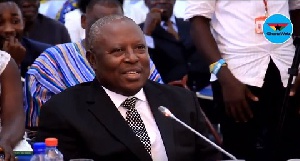Incoming Special Prosecutor Martin Alamisi Burns Kaiser Amidu has hinted that some individuals have allegedly begun going into exile.
He said there was no need for anybody to leave the country if that individual has not committed any offence.
“There is no need for any citizen to go into exile as some are alleged to have done, or to contemplate or fear my approval and pending appointment as Special Prosecutor, so long as that citizen has not seriously violated any law worth investigating or prosecuting in the national interest under my remit,” the former Attorney General said in his latest article to the media.
The title of the article, ‘My parting thoughts as citizen vigilante,’ appears to be his last ‘epistle’ before he resumes office as Ghana’s first Special Prosecutor.
Capricious exercise
He noted, “The 1992 Constitution protects every citizen from capricious exercise of discretion, and I will ensure strict compliance with the letter and spirit of the 1992 Constitution in protecting the citizen’s rights…,” and promised that he was not going to touch any individual who has not offended the law.
‘Perceptions’
Mr Amidu turned his attention to elements of the opposition National Democratic Congress (NDC) who are pushing him to apologize for saying that the corruption allegations he leveled against then-President John Mahama were ‘perceptions.’
He insisted that the fact that he told the Appointments Committee of Parliament during his vetting that his articles against the former president were based on ‘perceptions’ did not mean those allegations of massive corruption were not true.
“I wish to say my response at my approval public hearing that some of my articles are based on my perceptions and opinions does not mean that they were not based on fact or reality,” he explained.
Partisan questioner
The former Attorney General said he used the word ‘perception’ just to protect his sources, insisting, “I could not have given facts of corruption allegations in my articles to a partisan questioner without revealing or naming my informants and other sources and collection methods as a Citizen Vigilante.
“An in-depth acquaintance with the Philosophy and Methods of Research will show that perceptions and opinions need not be based on conjecture or non-facts or illusion,” he pointed out, adding, “Those learned in research methods and intelligence know that my answers were intended for the protection of my sources and collection methods, giving rise to the conclusions I arrived at in my several articles on corruption and abuse of power for private gain.”
Article three
According to the former Attorney General, Article 3 of the 1992 Constitution “would be hopeless if constitutional activists could not protect their sources and collection methods of information disclosing breaches of the Constitution and suspected commission of crime, and in particular, corruption offences.
“In the protection of my sources and collection methods as Citizen Vigilante under Article 3 of the Constitution, I used the words ‘perceptions’ and ‘opinions’ to stand for the intelligence acquired from my sources and collection methods; my perceptions and opinions were formed from real human sources and other real collection methods and therefore, could not have been based on conjecture.
Parting thoughts
He added, “I am writing these parting thoughts because the hearing was widely publicized, and many viewers and readers may not be well versed in the philosophy of research, research methodology, security and intelligence studies and conflict resolution studies.”
Mr. Amidu said it was important to “dispel in the matter of the debate whether perceptions and opinions are necessarily based on only speculation, or illusion or non-reality or non-fact.”
Quasi-judicial officer
He said he was probably firing for the last because “from the moment I take my oath of office, I will be a quasi-judicial officer enjoined to act impartially and independently in the execution of my duties.
“My voluntary acceptance to be appointed Special Prosecutor imposes upon me strict compliance with the Code of Conduct and Ethics of the legal profession in which I am viewed as an officer of the court, whether in or outside the courtroom while I remain in office. In view of my acceptance, there will of necessity be a change in the way I will exercise the plentitude of my cherished rights as a citizen in accordance with Article 3 of the Constitution.”
Presidential meeting
The former Attorney General and Minister for Justice said that since he met President Akufo-Addo on 9th January 2018 for a nomination confirmation discussion and accepted the potential nomination for consideration for approval by parliament, he considered himself a potential public servant and stopped his ‘citizen’s constitutional defence activism.’
“As I put it at my approval public hearing, the nomination gagged me from speaking or writing in the press as a private citizen would,” he stressed.
According to Mr Amidu, “It is in this spirit that I have taken comments and criticisms arising from my responses to the Appointments Committee of Parliament at my approval public hearing on 13th February 2018.”
General News of Friday, 23 February 2018
Source: dailyguideafrica.com













